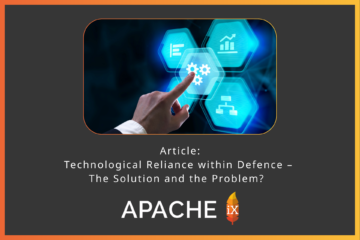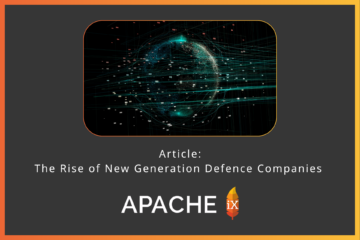

A global rise in the dominance of new and emerging technology has significantly affected all aspects of daily life; the defence industry is no exception, and there is no sign of this trend slowing down.
Now, more than ever, defence systems rely on data. The direction of travel for the Ministry of Defence is clear: data must be utilised effectively to provide a strategic advantage; it should be regarded as the second most valuable asset (after people) and therefore must be protected and leveraged accordingly. The next five years are crucial if UK defence wishes to exploit advanced data-related capabilities in the 2030s and beyond – the desire is to reach a state where decision-making is instantaneous and communication between sensors and actors is seamless.
Technologies such as Artificial Intelligence will be a key enabler as the nature of warfare continues to evolve and a new Digital Targeting Web, an enabler of rapid, integrated battlefield decision making, is established. As the ability to utilise and analyse data quickly, efficiently and accurately becomes ever more essential, AI can help by reducing the cognitive burden on personnel by filtering information and providing additional insights which can lead to better and faster decision making. This is supported by the 2025 Strategic Defence Review which recognises that there should be an immediate priority placed on shifting towards greater use of autonomy and AI within the UK’s conventional forces (Ministry of Defence, 2025). The UK government envisages this will lead to greater efficiency and productivity in delivering defence projects across all domains.
However, numerous challenges are presented when considering our technological transformation.
Simply improving the speed and efficiency of current tools and processes is not enough to achieve data-superiority and an information advantage over our adversaries. It will be essential to enable frontline forces across the globe friction-free access to the data they need in real-time, this will enable reliable and secure communication of trusted insights to reach those in the field that need it the most. The data, along with advance analytics, can then be drawn on for more effective planning resulting in higher success rates during deployed operations. We have now entered an information and technology warfare era where threats can emerge from our competitors simply having better, cheaper and more available commercial technologies.
The rise of digital technologies can also pose their own unique threats. With the increase in use of digital platforms and the prevalence of AI-generated content, it is now easier than ever to spread misinformation. The potential dangers of this are vast and difficult to quantify, but one area of particular concern is that this can lead to heightened geopolitical tensions. Additionally, a rapid rise in technologies such as AI may well prove a direct inhibitor to the UK’s 2050 Net Zero commitment; this problem spans far wider than just Defence. The National Grid has predicted that the power required to operate data centres used by AI and quantum computing could increase six-fold in the decade leading to 2034 (BBC News, 2024), this is likely to put a huge strain on the UK’s energy infrastructure, requiring further investment in greener technology to help tackle the rising demand. As Defence accounts for 50% of the UK central government’s emissions (Ministry of Defence, 2021), the industry has a vital role to play to help tackle the issue.
The solution to these threats is not simple. A balance must be struck between integrating and exploiting emerging technologies through all areas of capability to help deliver greater military effect and achieving the net zero target. Legacy systems must be transformed, data must be moved out of silos and organised to be utilised effectively and significant investment will be required to achieve the benefits set out in the Strategic Defence Review.
References
[1] BBC News. (2024). Data centre power use ‘to surge six-fold in 10 years’. Retrieved June 25, 2025, from https://www.bbc.co.uk/news/technology-68664182#:~:text=The%20boom%20in%20artificial%20intelligence%20%28AI%29%20and%20quantum,data%20centres%20-%20warehouses%20full%20of%20computer%20systems.
[2] Ministry of Defence. (2021). Climate Change and Sustainability Strategy.
[3] Ministry of Defence. (2025). Strategic Defence Review. London: Ministry of Defence.


